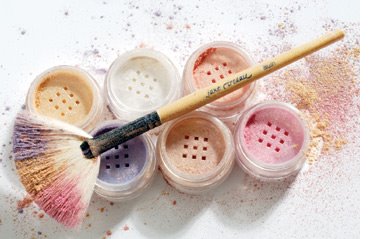 Looking to trade in hot flashes and night sweats for diapers and pre-school? If you're over 40 and thinking about getting pregnant - here's some new hope and some sage advice.
Looking to trade in hot flashes and night sweats for diapers and pre-school? If you're over 40 and thinking about getting pregnant - here's some new hope and some sage advice.
By Colette Bouchez
Just the thought of getting pregnant at a time when most of your gal pals are talking hot flashes and leaky bladders can make the whole idea seem, well, rather daunting - if not totally out of the question.
But daunting as it may be, the reality is that today more and more women over 40 are deciding to trade in hormone replacement for fertility drugs and try for a pregnancy - some for the very first time.
For many of you already considering the idea - and for those who are actively trying to conceive - you no doubt have been told that "donor eggs" is your best chance. And, in fact, the more birthdays you've had since age 40, the more likely it is that you've been told donor eggs is your only chance for conceiving a healthy baby.
Well, those recommendations may soon change, thanks to the work of New York fertility expert Dr. John Zhang. Why? He has just helped a 49 year old patient get pregnant and give birth to a healthy, baby girl - using her own eggs!
The birth sets a new record and expands the scientific boundaries of assisted reproductive technology by a considerable margin. Prior to this, the old oldest woman to get pregnant using her own eggs was aged 45.
“For any loving couple, it's one of the greatest gift ….both the doctor and the patient should not give up easily just because of a woman's age,” Zhang recently told The New York Post, who first reported the story.
Now, if you're thinking this new birth might be an exceptional case, and not likely to be repeated, well, guess again! A second patient at Zhang's New Hope Fertility Clinic - also age 48 – is now pregnant with her own eggs as well. They were retrieved and frozen when she was 47.
How The Pregnancy Occurred
Although it now seems that using your own eggs - even at age 48 - is possible, it doesn't mean that doing so will be easy. Treatment of the 49 year old patient – who right now wishes to remain anonymous – took about two years, with procedures taking place almost every month. Zhang says egg production was not regular, and many of the eggs that were produced were either not viable – meaning they could not be fertilized – or once fertilized were too unhealthy to survive in the womb.
But with doctor and patient refusing to give up, eventually, they stroke “baby gold” ! An embryo that had been fertilized , then frozen, in September of 2008, was placed in the mother's uterus the following March. Nine months later, the fruits of their labors paid off with the birth of a strong, healthy baby girl!
The NY Post reports that following the birth the new mom emailed friends and family with the message : "She's beautiful and healthy....she's definitely the love of our lives!"
Zhang, who specializes in helping older women realize their parenting dreams , says that ironically, the key to his success is not to use more fertility drugs, but actually, to use less.
In fact, he reports that many of his most successful protocols use little to none of the stimulation drugs commonly used by other fertility centers to help women manufacture multiple eggs. This may be particularly important for older women since there has been some evidence that large doses of egg stimulating medications, along with increased estrogen, may be linked to an increased risk of breast cancer – particularly at a time when a woman's risk are naturally rising due to her age.
Although Zhang is definitely a pioneer in this respect, he is clearly not alone by taking the "natural " approach. Indeed, many doctors are now using various nutrition protocols, including special diets, as well as vitamin and other nutrient combinations to naturally increase not only egg production and ovulation, but also increase the success rate of IVF procedures. There are currently a number of key studies showing the positive impact that the right dietary and nutritional protocol can have.
Additionally, Dr. David Barad and Dr. Norbert Gleicher of the Center for Human Reproduction, located in New York and Chicago, have been using the natural supplement DHEA - short for Dehydroepiandrosterone - to help women over 40 get pregnant faster and easier and have reported increased fertility in this group. DHEA is a precursor compound that the body uses to make steroid hormones, including some that are directly involved in egg production.
To date, however, Dr. Zhang appears to have the only fertility expert with IVF success at age 49.
To read more about the various ways in which diet and nutrition has been clinically shown to increase pregnancy rates, as well as improve IFV outcomes, and learn more about DHEA visit FertilityDietGuide.com .
To learn more about minimal stimulation IVF and other new advances in getting pregnant faster at any age, visit www.GettingPregnantNow.org .
Copyright by Colette Bouchez 2009 - All Rights Reserved.
In addition to US Copyright, the text of this RedDressDiary article is licensed under a Creative Commons Attribution-ShareAlike 3.0 License. All formatting and style elements of this page are not available under this license, and Colette Bouchez retains all rights in those elements.
Monday, November 23, 2009
Swapping Hot Flashes for Fertility Drugs: Pregnancy Over 40
Saturday, November 14, 2009
Men, Canned Ravioli and Sexual Dysfunction
 A new study suggests that overexposure to chemicals found in thousands of consumer goods - including food and beverage containers – could be causing problems in the bedroom for men- and their partners. Here's what you need to know.
A new study suggests that overexposure to chemicals found in thousands of consumer goods - including food and beverage containers – could be causing problems in the bedroom for men- and their partners. Here's what you need to know.
By Colette Bouchez
If a group of Chinese researchers are right, you may want to keep your partner from snacking on canned ravioli and beer. The reason: You just might see the after-effects in the bedroom - and not in a good way.
If a group of Chinese researchers are right, you may want to keep your partner from snacking on canned ravioli and beer. The reason: You just might see the after-effects in the bedroom - and not in a good way.
Indeed, new research published this week in the journal Human Reproduction found that bisphenol A or BPA - a chemical found in thousands of consumer products including the linings of food and beverage cans – may, in fact, be responsible for a wide range of sexual dysfunction problems in men, including erectile dysfunction and possibly infertility.
Head researcher De-Kun Li recently told the Washington Post “ Critics dismissed all the animal studies saying 'Show us the human studies'; now we have a human study and this just can't be dismissed,” he said.
The five year study followed 634 male works from four Chinese factories where exposure to BPA was significant. Researchers then compared the incidence of sexual dysfunction among these men with a control group who did not have workplace exposure to BPA.
The result: The men who were exposed to the BPA were four times more likely to suffer from erectile dysfunction and seven times as likely to have difficulty with ejaculation.
Moreover, it didn't take long periods of exposure for the sexual problems to kick in. Indeed, men who worked in the factories only a matter of months appeared to be as affected as those who spent years being exposed to the chemical.
In other research it has been shown that men who have either erectile dysfunction or ejaculation problems also experience a higher rate of infertility – and now some researchers are wondering if the two problems aren't “chemically” connected.
WHAT IS BPA - & WHERE IS IT HIDING?
BPA is a form of synthetic estrogen that is significant component in polycarbonate plastic.
Unfortunately, baby bottles – or even water bottles – are not the only place where BPA is lurking. Indeed, as a component of the “hard” plastic, BPA is found in literally thousands of consumer products used in food preparation or serving - including kitchen utensils, food storage containers, plastic mugs ( especially travel mugs), and inside the linings of some food and beverage cans. And it is, in fact, this food connection that is the cause for alarm.
Studies show the BPA in these containers and utensils can leach into food . Moreover, certain related factors, including heat, acid, age, microwaving and the use of certain harsh detergents can increase the likelihood of this happening, according to Frederick vom Saal, a biology professor and BPA researcher at the University of Missouri.
Moreover, it's not just your partner who should be concerned. Indeed, studies show that BPA is also linked to an increased risk of breast cancer - in both younger an older women.
Moreover, it's not just your partner who should be concerned. Indeed, studies show that BPA is also linked to an increased risk of breast cancer - in both younger an older women.
HOW MUCH BPA IS TOO MUCH BPA?
Clearly, the research shows that the men in the Chinese studies were routinely exposed to levels of BPA 50 times higher than the average North American man. And to this end, the American Chemical Society – which represents many manufacturers who use BPA in products - says the new study holds little concern for most Americans.
Indeed, Steven G. Hentges of the ACC recently told the press “ Although this study represents interesting information it has little relevance to average consumers who are exposed to trace levels of BPA,” he said.
Unfortunately, however, the “low dose” logic may not apply in this scenario. While traditional toxicology screens equate high doses of chemical contaminants with increased harm, specific tests on BPA show that lower doses may be even more toxic, simply because they “slip by” the body's natural defense system that would otherwise go to work detoxifying substances before they do harm.
In fact, in one study, low dose BPA exposure increased the risk of prostate cancer by 70% over high dose exposure, in lab animals.
Moreover, some experts contend that with so many products containing BPA, low level exposure may actually be chronic and continuing making it virtually impossible to calculate how much each man is getting – or how widespread that exposure might be among men already experiencing the symptoms represented in the study.
“Obviously some men are exposed more than others, and we do know that genetics also play a role, but that said, the association raises a red flag we shouldn't ignore – and it's definitely something that couples who are grappling with infertility should not ignore,” says Lauersen. Other studies have also shown BPA may have the potential to harm a woman's eggs thus further increasing fertility risks.
Because food and drink containers are such a large source of BPA, at least some of stink from this chemical cloud is hovers over the US Food and Drug Administration, which has been widely criticized for not regulating the chemical in the United States. Indeed, even their own scientific advisory committee voiced discontent over the fact that the FDA appears to ignoring more than 100 studies linking BPA to adverse health effects in animals including infertility, weight , behavioral changes, early -onset puberty, cancer and diabetes.
While the agency has reportedly pledged to re-examine the issue, to date, the FDA has maintains that BPA is safe. At the same time, the Canadian government has drafted legislation to prohibit the importation, sale and advertising of polycarbonate baby bottles that contain bisphenol A (BPA), and it has allocated 1.7 million dollars to further research the health effects of this chemical particularly in relation to food containers.
WHAT TO DO RIGHT NOW:
Colette Bouchez is the co-author of the new book "The New Fertility Diet Guide: Delicious Food Secrets To Help You Get Pregnant Faster ( Ivy League Press, NY )
Copyright by Colette Bouchez 2009 - All Rights Reserved.
In addition to US Copyright, the text of this RedDressDiary article is licensed under a Creative Commons Attribution-ShareAlike 3.0 License. All formatting and style elements of this page are not available under this license, and Colette Bouchez retains all rights in those elements.
Subscribe to:
Comments (Atom)



































